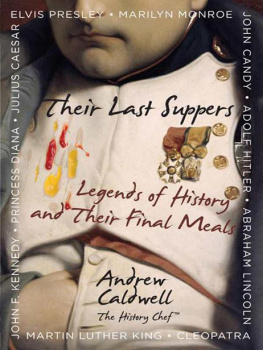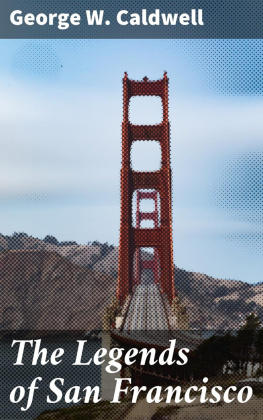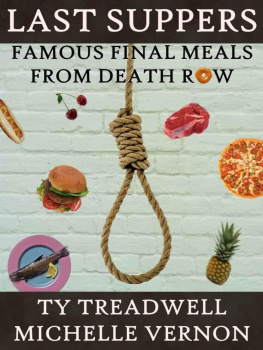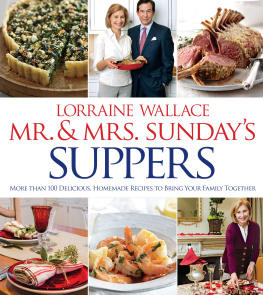Did you know that Adolf Hitler was a vegetarian and his longtime private chef was Jewish? What dish played an integral role in Marilyn Monroes unsuccessful bid to woo back Bobby Kennedy? Part historical narrative and part grilling guide and cookbook, Andrew Caldwells Their Last Suppers guides history buffs and gourmands alike through gastronomically inspired biographical accounts of more than twenty personalities from the pages of history whose deaths shook the world and created spectacular headlines. This culinary tour of the past describes the last meals of legends such as Alexander the Great, Elvis Presley, Princess Diana, Abraham Lincoln, Marilyn Monroe, Admiral Nelson, and many others, with detailed recipes included.
Unearthing dishes from as far back as 323 b.c., Caldwell, the History Chef, provides insight into more than 2,000 years of culinary lore. Each historical figures profile includes a brief description of pursuits and accomplishments as well as little-known anecdotes, popular foods of his or her time period, recipes for the figures actual last meal, and cooking tips. Because the kitchens of Montezuma, Caesar, and other notables profiled within the book were often very basic, Caldwell brings their fare into modern kitchens, and provides specific preparation tips throughout.
From the Titanics twelve-course tasting menu to personal recipes for Princess Dianas Favorite Watercress Soup, Elvis Presleys Fried Peanut Butter and Banana Sandwich, Julius Caesars Ambrosia, Cleopatras Hummus, and Stone Crab la Kennedy, historians and foodies alike will relish the trivia and tastings paired within Their Last Suppers: Legends of History and Their Final Meals.


Their Last Suppers 2009, 2010 Andrew Caldwell. All rights reserved. Printed in the United States of America. No part of this book may be used or reproduced in any manner whatsoever without written permission except in the case of reprints in the context of reviews. For information, write Andrews McMeel Publishing, LLC, an Andrews McMeel Universal company, 1130 Walnut Street, Kansas City, Missouri 64106.
E-ISBN: 978-1-4494-0188-7
Library of Congress Control Number: 2009943929
www.andrewsmcmeel.com
Cover design by Adrian Morgan
ATTENTION: SCHOOLS AND BUSINESSES
Andrews McMeel books are available at quantity discounts with bulk purchase for educational, business, or sales promotional use. For information, please write to: Special Sales Department, Andrews McMeel Publishing, LLC, 1130 Walnut Street, Kansas City, Missouri 64106
For my lovely daughters,
Juanita, Sheridan, and Celeste
Contents
Captain Edward John Smith
RMS Titanic, North Atlantic
April 15, 1912
Martin Luther King
Memphis, Tennessee
April 4, 1968
Napoleon Bonaparte
Defeated at Waterloo, Belgium
June 18, 1815
Alexander the Great
Babylon, Iraq
June 13, 323 B.C.
Diana, Princess of Wales
Paris, France
August 30, 1997
John F. Kennedy
Dallas, Texas
November 22, 1963
Montezuma II, Last Aztec Emperor
Tenochtitlan
June 30, 1520
Rasputin
St. Petersburg, Russia
December 20, 1916
Cleopatra
Alexandria, Egypt
August 6, 30 B.C .
Admiral Horatio Nelson
HMS Victory, Trafalgar, Spain
October 21, 1805
Abraham Lincoln
Washington, D.C.
April 14, 1865
Leonidas, King of Sparta
Thermopylae, Greece
August 18, 480 B.C .
Captain Ernst Lehmann
The Hindenburg, Lakehurst, New Jersey
May 6, 1937
Elvis Aaron Presley
Graceland, Memphis, Tennessee
August 16, 1977
Lord Frederick Chelmsford
Defeated at Isandlwana, South Africa
January 22, 1879
Gaius Julius Caesar
The Curia, Rome
March 15, 44 B.C .
George Armstrong Custer
Little Bighorn
June 25, 1876
Adolf Hitler
The Fhrerbunker, Berlin, Germany
April 30, 1945
Marilyn Monroe
Brentwood, California
August 5, 1962
Captain James Cook
Kealakekua Bay, Hawaii
February 14, 1779
John Franklin Candy
Durango, Mexico
March 4, 1994
Foreword
Since my early childhood I have been fascinated by all types of history, and over the years I have been ctunate to visit the pyramids of Egypt and Mexico, Roman ruins in England, France, and Spain, the conquistador trails of the New World, and the pirate haunts of the Caribbean. I was trained as a head chef and resort manager in some of the worlds finest resorts at the same time, enabling me to pursue my interests even more.
Eventually I was able to own my own little hotel in Albuquerque, New Mexico, where I was able to combine my love of food and history, for the enjoyment of our guests. Cocktail parties to celebrate the likes of Attila the Hun and Davy Crockett became themed weekends and a vital part of our business. I was struck by how little people seemed to know about historical events and how interested they became when an opportunity to discuss them came up. And so the idea for Their Last Suppers was born.
Its an efct to combine tales of the past with interesting menu ideas. All the principals here died untimely deaths that shook the world of their time, except for two: Napoleon lost only an empire at the Battle of Waterloo, and Lord Chelmscd mightily embarrassed one at the hands of the Zulus in South Africa. These were all powerful people in the prime of life, and their meals reflect the best of a varied and interesting choice of recipes, which help provide an insight into two thousand years of culinary history.
In doing my research for this book I noticed that nearly all these people made curious decisions that ultimately helped bring about their downfall. General Custer declined a Gatling gun battery en route to Little Bighorn on the grounds that it would slow him down. After a hectic day of travel, Princess Diana elected to leave the luxury of the Imperial Suite at the Ritz Hotel in Paris at midnight and drive to other lodgings across town. Captain Smith, of Titanic fame, was actually accelerating the ship toward known ice fields. President Kennedys staff took the bulletproof top off his limousine so that he could enjoy the weather in Dallas.
Although it has been possible to discover the exact last meal eaten by many of the people here, in a couple of cases such as Alexander the Great, accustomed to four- and five-day banquets, the best I have been able to do is select a few royal dishes of his time.
Likewise, although the kitchens of Montezuma, Caesar, and the rest were usually very basic affairs consisting of no more than spits, clay baking ovens, and open fires, I have attempted to bring the foods into modern kitchens with all our advantages and cooking aids, although I believe that wherever possible, grills and open fires should be used for these dishes.
For the sake of healthful eating, I suggest the use of extra virgin olive oil with most recipes, and for the same reason I have cut down on the salt content of most ancient foods.
I leave the appropriate drinks to the readers taste because the Mexican beers of today are a lot more palatable than the green lake water foam the Aztecs considered a delicacy, and the modern gourmand may not appreciate the pork blood beverage of the hardy Spartans.














